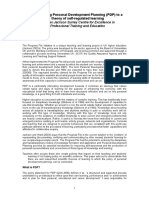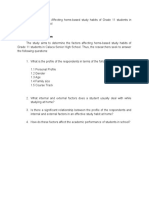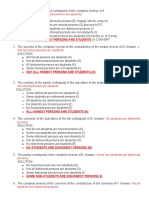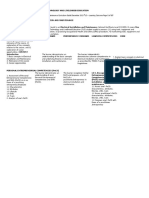0 ratings0% found this document useful (0 votes)
25 viewsPrinciple: Means The Beginning or The The End of All Things
Principle: Means The Beginning or The The End of All Things
Uploaded by
MarimarjnhioCopyright:
© All Rights Reserved
Available Formats
Download as DOCX, PDF, TXT or read online from Scribd
Principle: Means The Beginning or The The End of All Things
Principle: Means The Beginning or The The End of All Things
Uploaded by
Marimarjnhio0 ratings0% found this document useful (0 votes)
25 views4 pagesOriginal Title
NOTES
Copyright
© © All Rights Reserved
Available Formats
DOCX, PDF, TXT or read online from Scribd
Share this document
Did you find this document useful?
Is this content inappropriate?
Copyright:
© All Rights Reserved
Available Formats
Download as DOCX, PDF, TXT or read online from Scribd
Download as docx, pdf, or txt
0 ratings0% found this document useful (0 votes)
25 views4 pagesPrinciple: Means The Beginning or The The End of All Things
Principle: Means The Beginning or The The End of All Things
Uploaded by
MarimarjnhioCopyright:
© All Rights Reserved
Available Formats
Download as DOCX, PDF, TXT or read online from Scribd
Download as docx, pdf, or txt
You are on page 1of 4
PRINCIPLE
-It has been adopted from the Latin word PRINCEPS which
means the beginning or the the end of all things.
-Early Greeks used the term to express their
fundamental laws and to put out the ultimate
objectives.
-It is a comprehensive law or doctrine from which
others are derived or on which others are founded.
-It signifies a generalized statement through which
otherwise unrelated data area systematized and
interpreted.
-It is the chief guide to make teaching and learning
productive and effective.
-It is a general truth or guiding norm by which a
process is carried on.
FUNCTIONS AND SCOPES OF PRINCRIPLES
It should serve as the basis for intelligence and
profitable practice.
It should serve not only to stimulate, direct,
guide, but also to interpret established practices.
CONCEPTS OF TEACHING
It is an activity that follows and guides every
learner in their journey towards self-fulfillment.
The underlying principle of teaching is EXCELLENCE.
It is an occupation.
It is the myriad of activities and tasks.
It is an act.
It is a process or set of actions which leads to
learning and success.
TEACHING AS A MINISTRY
Ministry connotes the performance of certain
activities for others.
The bottom line of teaching as a ministry goes
beyond self.
The measure of one’s love is to love without
measure.
The measure of one’s unconditional teaching is
to teach without counting the cost.
TEACHING AS A PROFESSION
PD1006 (JANUARY 16, 1977)-professionalizes
teaching in the Philippines promulgating the
crucial and relevant role of teachers in
shaping the future of a nation through
education.
RA 7836- Philippine Teachers
Professionalization Act of 1994 strengthens the
regulation and supervision of the practice of
teaching in the Philippines.
NCBTS and PPST challenges every teacher to grow
personally and professionally.
It has its own body of specialized knowledge.
It upholds service over and above personal and
monetary profit.
It requires continuous professional growth.
It establishes its own policies and standards
for professional exercise.
It has its own unique professional
organization.
TEACHING AS A SCIENCE
It involves organized and objective planning
preparation and execution of lesson in order to
direct learners towards the different learning
episodes.
It commits itself to an unbiased analysis,
problem-solving and modification of the
outcomes of learning.
The community of learners with the guidance and
motivation of the teacher is in constant search
and enrichment of the learning input and
output.
TEACHING AS A VOCATION
It is a calling.
It is embracing and enjoying the profession,
its hardships and fulfillment.
TYPES OF TEACHING PRINCIPLES
STARTING PRINCIPLES- These involve the nature
of the child, his psychological and
physiological endowment which makes education
possible.
GUIDING PRINCIPLES- These refer to the
procedure, methods of instruction, or
agglomerations of techniques by which the
learner and the teacher may work together to
accomplish the educational goals.
ENDING PRINCIPLES- These refer to the
educational aims, goals, objectives, outcomes,
purposes of the whole educational scheme.
PROFESSIONAL QUALITIES
-This refers to the instructional competencies of a
good and effective teacher.
QUALITIES
o Mastery of the subject matter one teaches.
o Understanding of the learner.
o Understanding of the teaching principles and skills
in the use of methods, approaches, techniques as
well as instructional tools for their
implementation.
o Mastery of the medium of instruction.
o Mastery of educational psychology.
o Mastery of the lesson planning and organizing
instructional materials.
o Mastery of assessment of learning.
o Mastery of techniques of motivation.
o Mastery of the art of questioning.
o Mastery of the basics of guidance and counseling.
o Understanding and appreciation of the teaching
profession.
INSTRUCTIONAL COMPETENCIES
-Refers to the abilities of teachers to effectively
deliver the needs of the teaching-learning process.
Teaching skills
Guidance skills
Management skills
Evaluation skills
You might also like
- New Teaching Strategies To Enhance Performance in TleDocument21 pagesNew Teaching Strategies To Enhance Performance in Tleapi-29792640296% (146)
- Instructional Supervision For PractionersDocument39 pagesInstructional Supervision For Practionerslasuerte21200282% (11)
- 500.social Science Bullets PDFDocument522 pages500.social Science Bullets PDFMarimarjnhio67% (3)
- The General Principles of Teaching: Presented By: Ma. Chrisanta M. SoberanoDocument55 pagesThe General Principles of Teaching: Presented By: Ma. Chrisanta M. SoberanoNimrod CabreraNo ratings yet
- Principles and Strategies of Teaching MathematicsDocument29 pagesPrinciples and Strategies of Teaching MathematicsJanzen A. GabioNo ratings yet
- Curriculum Planning and ProgrammingDocument43 pagesCurriculum Planning and ProgrammingRufaida SeradNo ratings yet
- Education Has Always Been A Powerful Agency in Any Society and It Is Considered As An Indispensable Instrument For Bringing Positive Change in The SocialDocument11 pagesEducation Has Always Been A Powerful Agency in Any Society and It Is Considered As An Indispensable Instrument For Bringing Positive Change in The SocialLoreli LacanilaoNo ratings yet
- EDEM 506 Activity No. 1 - Compare and Contrast MatrixDocument5 pagesEDEM 506 Activity No. 1 - Compare and Contrast MatrixD-Lyca Fea SalasainNo ratings yet
- What Is Curriculum Implementation and Its ImportanceDocument6 pagesWhat Is Curriculum Implementation and Its ImportanceLeslie Ann CretesioNo ratings yet
- TTP ReviewerDocument4 pagesTTP ReviewerJohn Ray FelixNo ratings yet
- Outcomes of Teacher Education: Module No. and Title Lesson No. and Title Learning OutcomesDocument8 pagesOutcomes of Teacher Education: Module No. and Title Lesson No. and Title Learning OutcomesAriel BobisNo ratings yet
- 21ST Century TopicsDocument15 pages21ST Century TopicsMary Grace EncisaNo ratings yet
- ACTIVITY 1 - Curriculum Defined: Reflection #5Document9 pagesACTIVITY 1 - Curriculum Defined: Reflection #5clara dupitasNo ratings yet
- Portfolio AS Final RequirementDocument8 pagesPortfolio AS Final RequirementDaisyADenialNo ratings yet
- Cluster 1Document4 pagesCluster 1takena PowNo ratings yet
- Professional Teacher PreparationDocument30 pagesProfessional Teacher PreparationSubeena Gul67% (3)
- My Reading MemoDocument2 pagesMy Reading Memosahlee mae ngunyiNo ratings yet
- Module 1 BASIC CONCEPTSDocument35 pagesModule 1 BASIC CONCEPTSFernan CagaraNo ratings yet
- TI-Activity-1-INDUCTION-TO-TEACHING-INTERNSHIP ABALOSDocument10 pagesTI-Activity-1-INDUCTION-TO-TEACHING-INTERNSHIP ABALOSJoana AbalosNo ratings yet
- SLAC Teaching StrategiesDocument14 pagesSLAC Teaching StrategiesPhilame OranioNo ratings yet
- Pedu 202Document44 pagesPedu 202Mejane MonterNo ratings yet
- Inbound 7167192348243015243Document92 pagesInbound 7167192348243015243starr.garsuta31No ratings yet
- The Meaning and Importance of Principles of TeachingDocument20 pagesThe Meaning and Importance of Principles of TeachingVira LledoNo ratings yet
- WHETHER B.Ed PROGRAM HAD ENHANCED THE STUDENT TEACHERS MOTIVATION FOR TEACHINGDocument10 pagesWHETHER B.Ed PROGRAM HAD ENHANCED THE STUDENT TEACHERS MOTIVATION FOR TEACHINGAnonymous CwJeBCAXpNo ratings yet
- NCBTSDocument7 pagesNCBTSJeff Clifford LuyahanNo ratings yet
- paSCIENCEsiya Na KayoDocument5 pagespaSCIENCEsiya Na KayoCecil Rebecca ManalangNo ratings yet
- Curriculum DevDocument7 pagesCurriculum DevJaylord BucanegNo ratings yet
- TeachersDocument69 pagesTeachersYetaseb SeyoumNo ratings yet
- Unit 2 - Principles of Effective Intructions and Pillars of EducationDocument9 pagesUnit 2 - Principles of Effective Intructions and Pillars of EducationSamantha BaylonNo ratings yet
- EDUC 102 Lessons 1 2 Part of LM 1 MidtermDocument20 pagesEDUC 102 Lessons 1 2 Part of LM 1 MidtermRosie ToszieNo ratings yet
- Midterm-Compiled Answers - DEM 221BDocument40 pagesMidterm-Compiled Answers - DEM 221BMike francis DelacruzNo ratings yet
- Self-Instructional Manual (SIM) For Self-Directed Learning (SDL)Document6 pagesSelf-Instructional Manual (SIM) For Self-Directed Learning (SDL)loli popNo ratings yet
- Chapter 5 Modules 6 8Document12 pagesChapter 5 Modules 6 8asliahsamalNo ratings yet
- Curriculumdevelopment 180728180957Document55 pagesCurriculumdevelopment 180728180957Beulah DasariNo ratings yet
- GRP 9-Educational SupervisionDocument36 pagesGRP 9-Educational SupervisionGywneth Althea SangcapNo ratings yet
- Professional Education: PREPARED By-Shilpy MittaDocument30 pagesProfessional Education: PREPARED By-Shilpy MittaBhawna JoshiNo ratings yet
- Prelim Exam Zyrish LunaDocument3 pagesPrelim Exam Zyrish LunaMary Joy T. PuyoNo ratings yet
- Magan, Julie Ann M. - LEARNING LOG - 022212Document12 pagesMagan, Julie Ann M. - LEARNING LOG - 022212Faye Edmalyn De RojoNo ratings yet
- Outcomes-Based Education (OBE)Document2 pagesOutcomes-Based Education (OBE)NeWo YanTotNo ratings yet
- Supervision of InstructionsDocument17 pagesSupervision of InstructionsJudd PanagNo ratings yet
- ES331 - 14 Teaching CompetenceDocument21 pagesES331 - 14 Teaching Competenceraj RajNo ratings yet
- PPST ReflectionDocument1 pagePPST ReflectionWinston Datwin Rim83% (6)
- Prelim Exam For EceDocument2 pagesPrelim Exam For EceMarcelo RiveraNo ratings yet
- Curriculum ExpDocument3 pagesCurriculum ExpKim Nicole VargasNo ratings yet
- Concept of Health in Relation To Health CareDocument4 pagesConcept of Health in Relation To Health CarecherryamorecobenNo ratings yet
- Formulation of Philosophy, Objectives, Selection and Organization of Learning ExperienceDocument7 pagesFormulation of Philosophy, Objectives, Selection and Organization of Learning ExperienceMallika Joon100% (1)
- OUTCOMEDocument8 pagesOUTCOMEBobby GuetanNo ratings yet
- 06 HBEC1903 T2 (WM)Document16 pages06 HBEC1903 T2 (WM)Irfan AzmilNo ratings yet
- FS 1 16 On TeacherDocument11 pagesFS 1 16 On TeacherReneth SabantoNo ratings yet
- Outcome-Based Assessment-1Document5 pagesOutcome-Based Assessment-1Ryan Neil CajucomNo ratings yet
- PDP and Self-RegulationDocument11 pagesPDP and Self-RegulationSunwinartiNo ratings yet
- Chapter No 1: Education Is The Action or Process of Educating or of Being Educated. The KnowledgeDocument2 pagesChapter No 1: Education Is The Action or Process of Educating or of Being Educated. The KnowledgeRiffat RaniNo ratings yet
- Module 7 Curriculum Development PDFDocument9 pagesModule 7 Curriculum Development PDFManuel CruzNo ratings yet
- Teacher EducationDocument53 pagesTeacher EducationShah JunaidNo ratings yet
- Educ 108Document38 pagesEduc 108Jhomela MarcellanaNo ratings yet
- FS 1 Ep5 NEODocument8 pagesFS 1 Ep5 NEORalph Lowie NeoNo ratings yet
- CstpsDocument33 pagesCstpsapi-222875754No ratings yet
- Meaning and Importance of Principles of TeachingDocument11 pagesMeaning and Importance of Principles of TeachingAlfred Melvin Soliva100% (5)
- Crealearn Curriculum: Cordero, Maricris A. Ctp-Eced112 Subject: Proposed CurriculumDocument3 pagesCrealearn Curriculum: Cordero, Maricris A. Ctp-Eced112 Subject: Proposed CurriculumMarimarjnhioNo ratings yet
- Basic Economics With TLR: Measurement of The EconomyDocument2 pagesBasic Economics With TLR: Measurement of The EconomyMarimarjnhioNo ratings yet
- Sample of Promi LetterDocument1 pageSample of Promi LetterMarimarjnhioNo ratings yet
- Political Science (Art/Science)Document1 pagePolitical Science (Art/Science)MarimarjnhioNo ratings yet
- Correlation InterpretationDocument1 pageCorrelation InterpretationMarimarjnhioNo ratings yet
- Government and Politics of SEADocument1 pageGovernment and Politics of SEAMarimarjnhioNo ratings yet
- University of Silay: 1. F Similar F Collectivity F AggregatesDocument3 pagesUniversity of Silay: 1. F Similar F Collectivity F AggregatesMarimarjnhioNo ratings yet
- ISSUE On POLECONOMYDocument4 pagesISSUE On POLECONOMYMarimarjnhioNo ratings yet
- Tanauan CityDocument8 pagesTanauan CityMarimarjnhioNo ratings yet
- Factors Affecting Home-Based Study Habits of Grade 11 Students in Calaca Senior High SchoolDocument1 pageFactors Affecting Home-Based Study Habits of Grade 11 Students in Calaca Senior High SchoolMarimarjnhioNo ratings yet
- Books VAWDocument13 pagesBooks VAWMarimarjnhioNo ratings yet
- Conceptual Framework1.1Document4 pagesConceptual Framework1.1MarimarjnhioNo ratings yet
- Tanauan City: Brief HistoryDocument7 pagesTanauan City: Brief HistoryMarimarjnhioNo ratings yet
- Table 5. Proposed Program To Prevent Violence Against Women (VAW)Document3 pagesTable 5. Proposed Program To Prevent Violence Against Women (VAW)MarimarjnhioNo ratings yet
- Chapter 3Document5 pagesChapter 3MarimarjnhioNo ratings yet
- Correlation InterpretationDocument1 pageCorrelation InterpretationMarimarjnhioNo ratings yet
- Rotc Debate SideDocument2 pagesRotc Debate SideMarimarjnhioNo ratings yet
- A Proposed Program To Prevent Violence Against Women (Vaw) in Selected Barangays of Batangas CityDocument44 pagesA Proposed Program To Prevent Violence Against Women (Vaw) in Selected Barangays of Batangas CityMarimarjnhioNo ratings yet
- Aristotle AnalysisDocument2 pagesAristotle AnalysisMarimarjnhioNo ratings yet
- A Proposed Program To Prevent Violence Against Women (Vaw) in Selected Barangays of Batangas CityDocument16 pagesA Proposed Program To Prevent Violence Against Women (Vaw) in Selected Barangays of Batangas CityMarimarjnhioNo ratings yet
- Terms: Reviewer in Human Rights (MIDTERM)Document1 pageTerms: Reviewer in Human Rights (MIDTERM)MarimarjnhioNo ratings yet
- Presentation, Analysis and Interpretation of DataDocument43 pagesPresentation, Analysis and Interpretation of DataMarimarjnhioNo ratings yet
- Role of U.S Constitution: United States Government and Political System (Written Report)Document6 pagesRole of U.S Constitution: United States Government and Political System (Written Report)MarimarjnhioNo ratings yet
- Review of Related Literature and StudiesDocument31 pagesReview of Related Literature and StudiesMarimarjnhioNo ratings yet
- Logic For KeepsDocument2 pagesLogic For KeepsMarimarjnhioNo ratings yet
- Organizational BehaviorDocument6 pagesOrganizational BehaviorJenny Malabrigo, MBANo ratings yet
- XConvocationEndowmentGoldMedals 2019 20Document5 pagesXConvocationEndowmentGoldMedals 2019 20ALL DUBBED MOVIEWOODNo ratings yet
- Curriculum EvaluationDocument57 pagesCurriculum Evaluationmm coffeeNo ratings yet
- Health Impact Framework Paper Nur 310Document9 pagesHealth Impact Framework Paper Nur 310api-726326591No ratings yet
- PoonamBatraVoiceandAgencyofTeachersEPW October1-7Document11 pagesPoonamBatraVoiceandAgencyofTeachersEPW October1-7RiyaNo ratings yet
- Business A Changing World 9th Edition Ferrell Test BankDocument25 pagesBusiness A Changing World 9th Edition Ferrell Test BankMichaelJohnstonipwd100% (60)
- Handout 706 Controlled Radtke 09Document11 pagesHandout 706 Controlled Radtke 09aNo ratings yet
- DLL PEH 11 - 2nd QTR - Week 12Document4 pagesDLL PEH 11 - 2nd QTR - Week 12Jana MarisNo ratings yet
- (GATE IES PSU) IES MASTER Environmental Engineering - 1 (Water Supply Engineering) Study Material For GATE, PSU, IES, GOVT Exams PDFDocument194 pages(GATE IES PSU) IES MASTER Environmental Engineering - 1 (Water Supply Engineering) Study Material For GATE, PSU, IES, GOVT Exams PDFAmit RajNo ratings yet
- Letter Reply FormDocument3 pagesLetter Reply Formapisj5No ratings yet
- TLEDocument2 pagesTLERich Espina100% (1)
- Lasu MBADocument75 pagesLasu MBAParvez AlamNo ratings yet
- Implementing Rules and Regulations For Anti-Sexual HarassmentDocument7 pagesImplementing Rules and Regulations For Anti-Sexual HarassmentvisayasstateuNo ratings yet
- Labour and Architecture - Pier Vittorio Aurelli PDFDocument27 pagesLabour and Architecture - Pier Vittorio Aurelli PDFSabin-Andrei ŢeneaNo ratings yet
- Movement Grade 2 Term 2 2018Document13 pagesMovement Grade 2 Term 2 2018gidelove230No ratings yet
- Thesis Topics On Educational ManagementDocument8 pagesThesis Topics On Educational Managementjeanarnettrochester100% (1)
- A Colombian Classic Management Thinker: Alejandro López RestrepoDocument17 pagesA Colombian Classic Management Thinker: Alejandro López RestrepoNicolas MartignonNo ratings yet
- #English 2 SampleDocument20 pages#English 2 SampleszewcagnieszkaNo ratings yet
- Cot 1 Lesson Log ChemDocument3 pagesCot 1 Lesson Log Chemjudie butonNo ratings yet
- Mil ActivityDocument21 pagesMil ActivityEthyl Mae Miomio100% (1)
- Impact of Financial Literacy Program On Financial Behaviour A Case Study of Selected Nurses From Public Hospitals in GhanaDocument9 pagesImpact of Financial Literacy Program On Financial Behaviour A Case Study of Selected Nurses From Public Hospitals in GhanaEditor IJTSRDNo ratings yet
- Lesson Exemplar March 30, 2023Document4 pagesLesson Exemplar March 30, 2023Mehca Ali SacayanNo ratings yet
- 2015 Pt3 Gerak Gempur Marking SchemeDocument8 pages2015 Pt3 Gerak Gempur Marking SchemeyatcumilNo ratings yet
- Answers For InterviewDocument4 pagesAnswers For InterviewAna Laura Velis GutierrezNo ratings yet
- MakingARainGauge PDFDocument3 pagesMakingARainGauge PDFjuanp1020No ratings yet
- 90% SolutionDocument7 pages90% SolutionErik MontañoNo ratings yet
- Effectiveness o-WPS OfficeDocument7 pagesEffectiveness o-WPS OfficeCherry Ann Cainglet RetarinoNo ratings yet
- Lac Proposal E-PortfolioDocument5 pagesLac Proposal E-PortfolioLoida NarvaezNo ratings yet
- A Day in The Life of An Acient KingDocument6 pagesA Day in The Life of An Acient KingAlex prhNo ratings yet
- Study SkillsDocument9 pagesStudy SkillsHemo990No ratings yet



















































































































